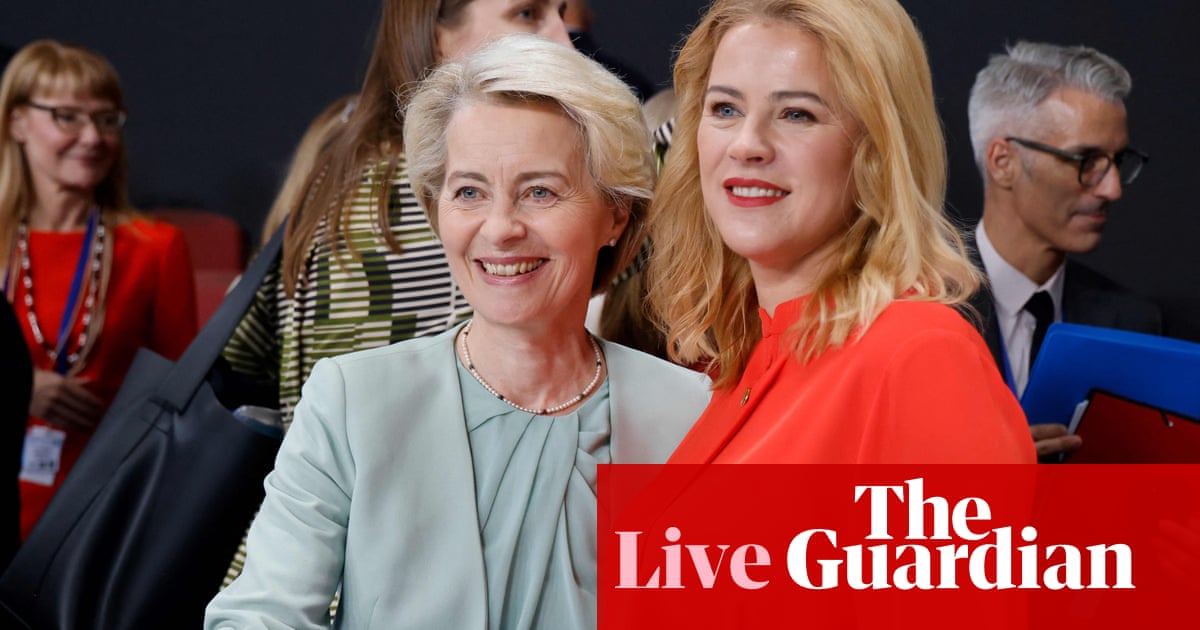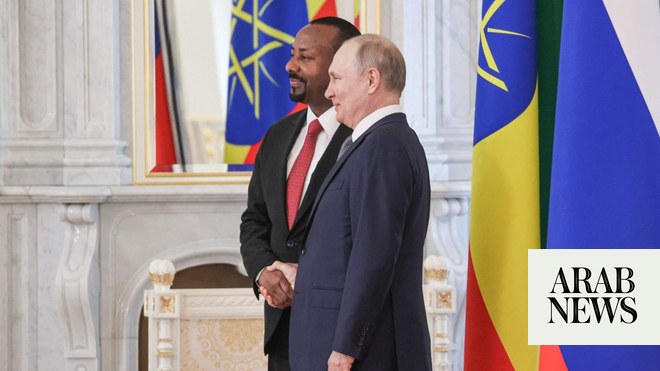
The sudden transatlantic chasm over Ukraine will be laid bare on Monday when US officials start preliminary talks in Riyadh with Russian counterparts over a ceasefire just as Emmanuel Macron hosts a Paris summit of European defence powers to demand the US ends the lockout of Europe and Kyiv from the process.
The US and Russia talks come ahead of a planned meeting this week between the Russian foreign minister, Sergei Lavrov, and the US secretary of state, Marco Rubio, the first such meeting between the two countries in over two years. There are fears in Europe that Russia via the US talks will relaunch its plan for imposed Ukrainian neutrality and a joint US-Russia carve-up with agreed spheres of influence.
The Paris meeting will aim to outline a European action plan after days of chaotic briefing by the Trump administration. The summit will also need to decide how to respond to a request by the US to spell out whether leaders are prepared to commit troops to a stabilisation force in the event of a ceasefire.
Keir Starmer will attend, as well as Germany’s chancellor, Olaf Scholz, and Poland’s prime minister, Donald Tusk. France is determined that the UK is closely involved in all future discussions on Ukraine.
Downing Street said it believed Starmer could play a central role in securing Ukraine’s future by conveying Europe’s warnings against a potential US-Russian carve-up of the country directly to Trump when the prime minister visits Washington DC next week. He will then report back to other European leaders. “It’s not a role we necessarily looked for, but it’s one the PM wants to step into,” a source said.
The Ukrainian president, Volodymyr Zelenskyy, speaking in an interview from the Munich Security Conference, said he was doubtful that Vladimir Putin was prepared to make concessions and repeated his claim that Russia was planning an attack on Nato countries next year. Ukraine and many of its closest European allies believe Putin wants a recasting of the postwar order as his precondition for a ceasefire.
Confirming the Paris meeting, France’s foreign minister, Jean-Noël Barrot, told France Inter radio on Sunday: “The president will bring together the main European countries tomorrow for discussions on European security.” He said there was a wind of unity blowing through.
European diplomatic sources said the Monday afternoon summit would also include Italy and Denmark – representing the Baltic and Scandinavian countries – as well as the Nato secretary general, Mark Rutte, and the president of the European Commission, Ursula von der Leyen.
It will discuss what defence capabilities Europe could provide to give Ukraine credible security guarantees, including a plan for Ukraine to be given automatic Nato membership in the event of a clear ceasefire breach by Russia. The US has said there must be devastating consequences for any side that breaches a ceasefire agreement, an element missing from previous Ukraine ceasefires since 2014.
“Only the Ukrainians can decide to stop fighting,” Barrot said. The Ukrainians “will never stop as long as they are not sure the peace suggested to them will be long-lasting”.
An offer of Nato membership conditional on a Russian ceasefire breach – probably requiring the US to remain a backstop guarantor for Ukraine – has been promoted by some US senators and now has the backing of senior European leaders, including Alexander Stubb, the Finnish president. He insisted the door should not be open for a Russian fantasy about spheres of influence.
Keith Kellogg, the US special envoy on Ukraine, briefed European leaders in Munich on the US negotiating strategy, which the Polish foreign minister, Radosław Sikorski, described as unorthodox.
Neither Ukraine nor European states have been invited to the talks in Riyadh. Kellogg argued their views would be taken into account, and claimed earlier peace talks had foundered due to the large negotiating table.
It became evident over the weekend that there were contrasting approaches within the Trump administration towards future talks over Ukraine. Rubio insisted on Sunday that any peace agreement in Ukraine would have to be enduring, fair and respect Ukrainian sovereignty. He also said Ukraine and Europe would have to be involved in any meaningful talks.
“The president expressed his desire to see an end to this conflict in a way that was enduring, and that protected Ukrainian sovereignty, and that was an enduring peace, not that we’re going to have another invasion in three or four years,” Rubio told the CBS programme Face the Nation while on a visit to Israel.
Trump last week surprised Ukraine and America’s allies by announcing he had discussed Ukraine’s future in a phone call with Putin on Wednesday. The president said nothing about Ukrainian sovereignty and even suggested that Ukrainians might “be Russian some day”.
Macron has said he is not shocked or surprised by the speed with which Trump is acting to drive a ceasefire bargain, but European officials fear Russia is seeking not only Ukraine’s neutrality through capping the size of its army and the ousting of Zelenskyy, but also a spheres of influence agreement akin to the Yalta agreement signed over the heads of many nations in 1945 by the US, Britain and the Soviet Union.
That would put some western countries within “a sphere of coercion in which nations lives in fear”, one official said.
European leaders are divided in their response to Trump’s initiatives, with some predicting the opening of a fundamental rupture between Washington and Europe, and others arguing that if Europe can fulfil the US demand to improve its security offer then the transatlantic relationship can be repaired and Europe will find a place at the table on the future of Ukraine.
Downing Street said Starmer’s meetings with European leaders and Trump in successive weeks were in part an accident of scheduling, but also reflected the government’s desire to be a bridge to the US. It said Starmer was expected to try to lower the temperature.
“Our whole approach is to not be alarmed by anything, but to try and be a calm partner for the US, and to play the role we can, which is to be a bridge,” the No 10 source said. “That’s why we can’t get distracted by things like JD Vance’s speech. Whatever your view on that, there are much bigger things to focus on.”
The EU leaders are also expected to discuss the outlines of a major boost to defence spending triggered by budget increases, and a relaxation of EU debt rules applying to defence investment.
“We will launch a large package that has never been seen in this dimension before,” said the German foreign minister, Annalena Baerbock. “Similar to the euro or the corona crisis, there is now a financial package for security in Europe. That will come in the near future.”
It is likely to be launched after the German elections next weekend.
The phrasing of a call to arms issued to Europe by Zelenskyy in Munich on Saturday was regarded as unhelpful because he couched it in terms of a unified European army, anathema to many voters, but Macron has long argued that a distinctive European force is required. He was also the first nearly a year ago to suggest European forces enter Ukraine on an initial training mission.
Sikorski, the Polish foreign minister, said: “If the US wants us to step up in defence, it should have a national component, a Nato component, but I also believe a European EU component, EU subsidies for the defence industry to build up our capacity to produce, but also an EU force worthy of its name.”
He reiterated that having Polish troops on the ground in Ukraine was “not a consideration, because Poland’s duty to Nato is to protect the eastern flank, ie its own territory.”












